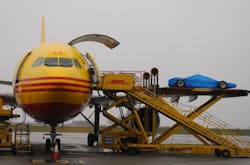Martin Lee, business development executive for logistics software firm WiseTech Global, offered up some interesting insight into the growing need for “flexibility” as skill critical for survival in the modern-day rough-and-tumble freight transportation world.
Indeed, this is no exaggeration when companies face the decidedly grim tasks of figuring out how to efficiently ship goods in and out of war-torn places like the Middle East and the Ukraine – places where bullets, bombs, and the threat of violent death lurk around almost every corner.Throw in areas of the world riddled by sudden outbreaks of highly deadly infectious diseases – West Africa and Ebola come to mind – and wouldn’t surprise me one bit if many suddenly view a logistics career with something far less than enthusiasm.
“The logistics industry landscape is constantly being battered by the rough seas of internal and external pressures; there has always been a crisis just around the corner,” Lee explained in a recent missive.
“The current external pressures within the EMEA [Europe/Middle east/Africa] region, for example, arise from the political stage in the form of sanctions and counter sanctions to restrict trade with Russia,” he added. “And these are having a devastating impact on forwarders with heavy commitments in the movement of goods to and from the area.”
On top of that, what Lee dubs the “eruption of war and political instability” in some Middle Eastern countries put what only charitably can be called “additional pressures” on logistics providers; not to mention concern for colleagues on the ground.
But therein lies the rub, doesn’t it? For without strong and efficient supply chains – without the logistical savvy to move desperately needed goods into and out of chaotic “hot spots” around the world – a lot more can and will quickly go wrong.
[Martin Christopher, emeritus professor of marketing and logistics at Cranfield School of Management in the U.K., touched on similar themes a few years back in the video interview below.]
WiseTech’s Lee noted that trying to survive day-to-day in such situations while providing professional logistics service requires in his words “courage and dedication” as well as a great need for “flexibility.”
Yet he warned such stresses can also cause logistics providers to focus on the short term, on immediate surroundings, on just the here-and-now.
“This leads to the very human ‘fight-or-flight’ reactions and ‘knee-jerk’ responses,” Lee said. “Some companies will panic at the first signs of difficulty when their revenue takes a drop and try to sell their company for pennies, dropping them into the crushing depths of oblivion.”
Others might try to hold onto their current position by battening down the hatches and floating aimlessly while hoping for a return to the safety of the world they once knew.
“Those companies inevitably sink as they watch their market share taken by more agile competitors,” he pointed out. “We all know the logistics industry, in one form or another, has been around since the dawn of trade and that we need to move with the times and tides of our environment. We must always be looking for ways to move forward, even in the toughest of times.”
[Cranfield’s Christopher offers some further thoughts in that direction within the video below.]
Lee said that, based on his 25 years of experience in the logistics world, he believes the big reasons companies succeed in the freight business comes down to flexibility – flexibility built into their operations, infrastructure, and workforce so they can look beyond the present to future opportunities.
“That enables them to make decisions strategically for the long haul,” Lee explained. “Those that thrive when the going gets tough have invested in their flexibility and their ingenuity. They adapt to the needs and changes within the industry, and they draw from their experience to plan for resilience in the face of internal and external pressures.”
He added that such “flexibility” in operational processes allows logistics providers to expand and contract as customer demands change. Structured staff development further allows the, to manage skill gaps, maximize quieter times, and build loyalty.
“Critical to the better management of your staff is having a means by which you can see into their individual workloads,” Lee pointed out. “When times are quiet, it’s the human nature of your staff to stretch their workload to fill the day. By offering avenues for professional growth, you train them to push for higher throughput and customer service.”
He also offers this interesting thought: from his perspective, the cloud is the greatest single asset a logistics provider can use to be both flexible and resilient. [Though it can also be a major data security risk, too; click here for more on that.]
“It provides you and your customers with the flexibility to survive when disaster happens,” Lee stressed. “With a virtual office, you can work from any place that has an internet connection, secure in the knowledge that your data is safe.”
Some ideas to keep in mind as the logistical seas will most likely only continue to get more roiled in the days ahead.




